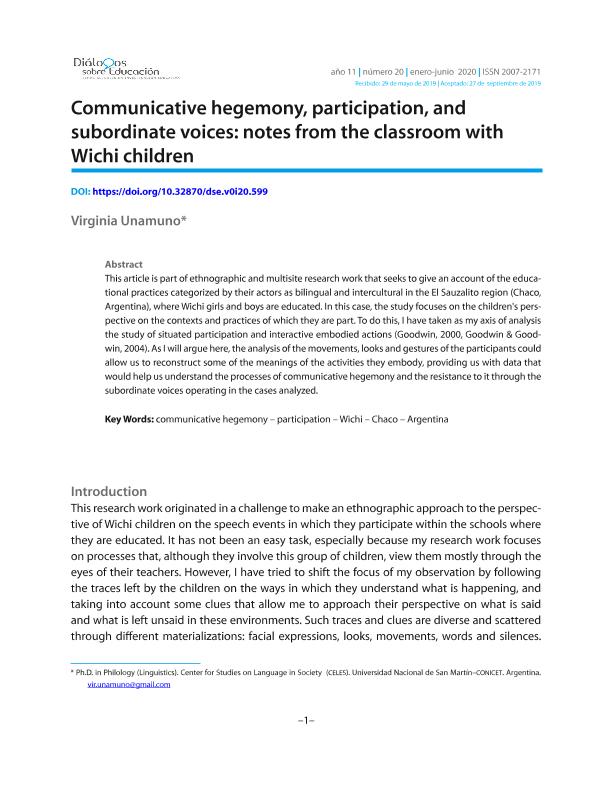Mostrar el registro sencillo del ítem
dc.contributor.author
Unamuno, Virginia

dc.date.available
2021-09-22T15:57:16Z
dc.date.issued
2020-06
dc.identifier.citation
Unamuno, Virginia; Communicative hegemony, participation, and subordinate voices: notes from the classroom with Wichi children; Universidad de Guadalajara; Diálogos sobre Educación; 20; 6-2020; 1-14
dc.identifier.issn
2007-2171
dc.identifier.uri
http://hdl.handle.net/11336/141192
dc.description.abstract
Este artículo se enmarca en una investigación etnográfica y multisituada que busca dar cuenta de las prácticas educativas categorizadas por sus actores como bilingües e interculturales, en la región de El Sauzalito (Chaco, Argentina) en donde se escolarizan niñas y niños wichi. En este caso, el estudio se centra en la perspectiva de los niños sobre los contextos y las prácticas de los que forman parte. Para ello, tomo como eje de análisis el estudio de la participación situada y de las acciones interactivas corporizadas (Goodwin, 2000; Goodwin y Goodwin, 2004). Según se argumentará aquí, el análisis de los movimientos, las miradas y los gestos de los participantes permitirían reconstruir algunos sentidos sobre las actividades que ellos encarnan. Esto, en definitiva, ofrecería datos para entender los procesos de hegemonía comunicativa y la resistencia a través de voces subalternas que operan en los casos que se analizan.
dc.description.abstract
This article is part of ethnographic and multisite research work that seeks to give an account of the educational practices categorized by their actors as bilingual and intercultural in the El Sauzalito region (Chaco, Argentina), where Wichi girls and boys are educated. In this case, the study focuses on the children's perspective on the contexts and practices of which they are part. To do this, I have taken as my axis of analysis the study of situated participation and interactive embodied actions (Goodwin, 2000, Goodwin & Goodwin, 2004). As I will argue here, the analysis of the movements, looks and gestures of the participants could allow us to reconstruct some of the meanings of the activities they embody, providing us with data that would help us understand the processes of communicative hegemony and the resistance to it through the subordinate voices operating in the cases analyzed.
dc.format
application/pdf
dc.language.iso
eng
dc.publisher
Universidad de Guadalajara

dc.rights
info:eu-repo/semantics/openAccess
dc.rights.uri
https://creativecommons.org/licenses/by-nc-sa/2.5/ar/
dc.subject
COMMUNICATIVE HEGEMONY
dc.subject
PARTICIPATION
dc.subject
WICHI
dc.subject
CHACO
dc.subject.classification
Lingüística

dc.subject.classification
Lengua y Literatura

dc.subject.classification
HUMANIDADES

dc.title
Communicative hegemony, participation, and subordinate voices: notes from the classroom with Wichi children
dc.title
Hegemonía comunicativa, participación y voces subalternas: notas desde las aulas con niños y niñas wichi
dc.type
info:eu-repo/semantics/article
dc.type
info:ar-repo/semantics/artículo
dc.type
info:eu-repo/semantics/publishedVersion
dc.date.updated
2021-09-07T18:08:31Z
dc.journal.volume
20
dc.journal.pagination
1-14
dc.journal.pais
México

dc.description.fil
Fil: Unamuno, Virginia. Universidad Nacional de San Martín. Escuela de Humanidades. Laboratorio de Investigación en Ciencias Humanas - Consejo Nacional de Investigaciones Científicas y Técnicas. Oficina de Coordinación Administrativa Parque Centenario. Laboratorio de Investigación en Ciencias Humanas; Argentina
dc.journal.title
Diálogos sobre Educación
dc.relation.alternativeid
info:eu-repo/semantics/altIdentifier/url/http://dialogossobreeducacion.cucsh.udg.mx/index.php/DSE/article/view/599
dc.relation.alternativeid
info:eu-repo/semantics/altIdentifier/url/https://doi.org/10.32870/dse.v.0i20.599
Archivos asociados
